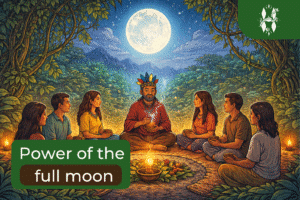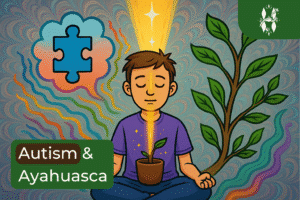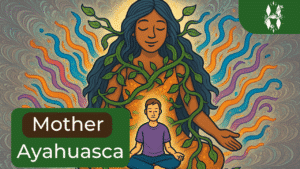Introduction:
Ayahuasca, known for its profound and intense transformative power, can initiate deep shifts within individuals, often leading to significant personal and spiritual growth. However, during these profound changes, a subtle yet potentially limiting trap can emerge: the formation of a ‘spiritual ego.’
This phenomenon, while not often discussed, is an important aspect to consider for anyone on their spiritual journey, especially those who have experienced the depths of Ayahuasca.
But what exactly is a spiritual ego? How can we recognize its presence in ourselves or others, and more importantly, why is it considered a limitation rather than a progression on the spiritual path? Addressing these questions is crucial to ensuring that our journey towards healing and growth doesn’t inadvertently lead us astray.
In this exploration, we will dive into the nature of the spiritual ego, its signs and symptoms, the ways it can subtly undermine true spiritual growth, and strategies for recognizing and avoiding it in our own personal journeys.
Key takeaways:
- Instead of using traditional status symbols the spiritual ego uses different measuring sticks.
- The underlying mechanism of the ego remains the same, about being right, defending one’s viewpoint, proving the other person wrong and trying to gain a sense of superiority (to cover up an internal sense of inadequacy)
- True spirutality is anchored in humility and gratitude and does need to convince its environment on how spiritual one is.
Table of Contents
What is the ego:
Understanding the concept of ego is crucial before we delve into the notion of a ‘spiritual ego,’ particularly in the context of Ayahuasca and spiritual transformation.
The ego, as previously discussed in the blog on ‘Ego Death,’ has a variety of interpretations but often refers to the part of us that craves affirmation and superiority, masking deeper insecurities or feelings of inadequacy.
In many Western cultures, the ego often manifests through material accomplishments and comparisons: who has the most luxurious car, the most impressive house, or the most attractive partner.
These external symbols become measures of self-worth, driving a desire to appear superior in the eyes of others (in order to mask an inner feeling of unworthiness).
However, following an Ayahuasca experience, a person’s priorities may shift profoundly. The realization might dawn that material wealth isn’t the ultimate yardstick of life’s value.
Yet, this newfound understanding doesn’t automatically dissolve the underlying mechanisms of the ego. The need for validation and a sense of superiority can stubbornly persist, only now it may express itself in a different guise.
This is where the spiritual ego comes into play. Post-Ayahuasca, as individuals reassess their values and what they consider important, there’s a risk of substituting traditional status symbols with more ‘spiritual’ ones. Instead of competing over material possessions, people might begin to measure their worth by:
Number of ceremonies: Boasting about the number of Ayahuasca ceremonies one has participated in, as if it were a badge of honor or spiritual maturity.
Number of cups: Some might take pride in the amount of Ayahuasca they consume during ceremonies, equating higher doses with greater spiritual prowess.
Minimalism as Superiority: Contrarily, there can be a sense of superiority in needing fewer ceremonies to achieve insights, implying a more ‘advanced’ spiritual state.
Meditation Practices: Pride in the frequency or duration of meditation practices can also be a sign, suggesting a belief that more meditation equates to higher spiritual standing. Especially the notion that one is more advanced because one meditates more.
Environmental Consciousness: Using one’s carbon footprint or eco-friendly habits as a means to feel superior to others veers into the territory of spiritual ego.
Rejecting Mainstream Culture: A sense of pride in not participating in the ‘rat race’ or not conforming to mainstream news and culture, implying a sense of awakening or enlightenment that others lack.
These are just a few examples, and there are undoubtedly many more ways in which a spiritual ego can manifest.
The ego, still operating from a place of needing to feel superior, merely shifts its focus from the material to the spiritual realm. Understanding this subtle transition is key to recognizing and addressing the emergence of a spiritual ego in our journey of personal and spiritual growth.
Must read Blog: Ayahuasca ego death – reset your current identity
The underlying mechanism
Peeling back the layers to understand the truth behind such behaviors reveals a fundamental aspect of the ego: its tendency to create separation and a sense of superiority.
Taking the example of environmental consciousness, while it is undoubtedly beneficial and important for the health of our planet, the moment it transforms into a means of feeling superior to others, its essence becomes distorted.
This sense of superiority, of setting oneself apart as more aware or more enlightened, is a classic trait of the ego at work. The ego thrives on distinction and separation. In the spiritual context, especially in teachings echoed in Ayahuasca experiences, the emphasis is often on the interconnectedness of all beings, the dissolution of the illusion of separateness.
When environmental consciousness—or any other commendable quality or practice—becomes a yardstick to measure oneself against others, it feeds into the ego’s divisive nature. This not only contradicts the spirit of oneness but also hinders genuine personal and spiritual growth.
It creates a barrier, an ‘us versus them’ mentality, which is counterproductive to the very essence of most spiritual paths that advocate for unity, compassion, and understanding.
Recognizing this tendency is crucial in avoiding the pitfalls of the spiritual ego. It’s about embracing positive practices and beliefs not as tools for self-aggrandizement, but as expressions of a deeper understanding of our interconnectedness and shared journey towards a better world.
This approach fosters a true spirit of oneness, moving beyond the ego’s divisive tendencies.
The spiritual ego is obvious to everybody around it and annoying
The impact of a spiritual ego on one’s social environment is often quite stark and generally not well-received. Typically, everyone except the individual with the spiritual ego can see its effects, and it tends to be a source of annoyance or discomfort.
The reason is simple: people naturally resist when someone appears to be flaunting their perceived (spiritual) superiority or achievements. This kind of behavior, which can come off as self-righteous or condescending, rarely garners the admiration or validation the individual might seek.
Moreover, people generally do not appreciate being preached to about how they should live their lives or what spiritual paths they should follow. This can lead to friction and arguments, as those on the receiving end of such unsolicited advice or judgment react against what they perceive as arrogance or intrusiveness.
In response, the person with the spiritual ego may further entrench themselves in their beliefs, viewing others as less enlightened or aware, thereby reinforcing their sense of superiority.
Must read Blog: Mistakes after Ayahuasca and how to avoid them
Find out if Ayahuasca is right for you
- Will you be safe physically and emotionally?
- How will you be supported in the ceremony?
- How do the facilitators handle difficult situations?
- How will you be able to process the experience?
- You want change, but will your life be unrecognizable after Ayahuasca?
+ 13 things to consider before drinking Ayahuasca?
Attracting a romantic partner through the spiritual ego
The shadow side of spiritual practice, including the use of one’s experiences with Ayahuasca, can manifest in various ways, and one of them is the use of a spiritual ego as a tool for attracting romantic partners.
This dynamic is particularly evident when individuals with various Ayahuasca ceremonies use their perceived advanced status to create an aura of authority and expertise.
This can be particularly appealing to newcomers or those less experienced in the realm of Ayahuasca, who may view these “Ayahuasca veterans” as figures of spiritual authority or wisdom.
It’s important to approach such situations with a healthy dose of skepticism and awareness. The notion of someone positioning themselves as an enlightened guru, especially as a means to foster romantic connections, can be a red flag.
Be cautious of individuals who might claim to have special insights into your spiritual journey, such as being your twin flame or a connected soul from a past life, particularly if they use these claims as a basis for advancing a romantic relationship.
True spiritual connection and guidance should be free from ulterior motives and should respect the personal and spiritual autonomy of each individual.
Must read Blog: Ayahuasca and relationships – the impact of Ayahuasca on romantic relationships
Observe for yourself:
Observing and understanding our own behaviors and reactions is a crucial step in recognizing and addressing the spiritual ego within ourselves. It’s important to pay attention to moments when pride, judgment, or a sense of superiority creep into our thoughts and actions. Each of these instances offers a valuable opportunity for introspection.
When you catch yourself feeling proud in a way that sets you apart from others, or when you notice you’re judging someone or feeling superior, pause and look deeper.
Ask yourself: What’s driving these feelings? Often, you’ll find these reactions are rooted in deeper, perhaps unacknowledged, parts of your ego. These are moments where you’re attaching your identity to certain beliefs, achievements, or perceptions
This self-awareness can reveal how you might be using these identifications to bolster a sense of self or to engage in arguments or conflicts that ultimately stem from a need to affirm your ego. By consistently practicing this level of self-reflection, you can start to unravel the layers of the spiritual ego, understand its origins, and begin to let go of these limiting identifications.
This process is essential for genuine spiritual growth and for maintaining an authentic, humble approach to your spiritual journey.
Must read Blog: Ayahuasca Integration – how to maintain the magic of Ayahuasca
Allow things and people to be
Embracing the beauty of simply being, without the urge to prove oneself or assert dominance over others, is a liberating aspect of personal growth.
Imagine a state of existence where your self-worth isn’t contingent on others’ perceptions, where the need to validate your opinions or belittle others’ choices becomes unnecessary.
Imagine a life where happiness isn’t derived from controlling or changing those around you but from an inner contentment that’s independent of external factors.
This approach to life allows for a profound sense of freedom and authenticity. Engaging in activities purely for the joy they bring, without the compulsion to broadcast these experiences on social media or seek external validation, can be incredibly fulfilling.
It’s about shedding the need for constant internal commentary or judgment and embracing a more peaceful, present way of living.
As you begin to release these patterns and stop expending energy on maintaining a certain image or proving your worth, you’ll find that you have more energy available for meaningful pursuits.
This energy can then be channeled into following your intuitive hunches, exploring your passions, and engaging with the world in a more authentic and fulfilling way.
Letting things and people be and accepting them as they are opens up a space for genuine connection and understanding. It allows for interactions that are rooted in respect and appreciation rather than judgment and ego.
This shift in perspective can lead to more harmonious relationships, a deeper sense of peace, and a greater alignment with your true self.
True spirituality is connected with humility and gratitude
True spirituality, at its core, is deeply entwined with humility and gratitude. These qualities reflect a mature understanding of life’s impermanence and the fortuitous nature of our circumstances.
A truly spiritual person recognizes the serendipity in their journey, acknowledging the lucky breaks and the confluence of factors that have led them to where they are. This awareness creates a sense of humility—an understanding that life is a complex weave of experiences and that no single person is solely responsible for their successes or failures.
Humility in spirituality translates to a relinquishing of the need to always be right and to prove oneself to others. The pursuit of validation and approval becomes less important as one realizes that true self-worth doesn’t hinge on external affirmations.
Clinging to these external validations only leads to more attachments and a dependency on others for self-esteem, essentially giving away personal power.
Parallel to this humility is a deep sense of gratitude. This isn’t just a fleeting acknowledgment of good fortune but a profound appreciation for the very essence of divinity that permeates life. It’s about recognizing and valuing one’s talents, skills, and determination, and understanding that these attributes are part of existence.
Such gratitude extends to an appreciation of the interconnectedness of life, acknowledging that many of our achievements and joys are not solely our own making but are also influenced by forces and interactions beyond our control.
This level of spirituality doesn’t negate self-confidence; rather, it brings a quiet confidence that doesn’t need to be broadcast. It comes with the knowledge that while we play a significant role in shaping our lives, we are also participants in a grander, more dynamic exchange with life and spirit.
Humility and gratitude, in this sense, are not about diminishing oneself but about recognizing our place in the vast, intricate network of existence and feeling deeply thankful for our part in it.
If you are interested in experiencing Ayahuasca for yourself, we invite you to consider Ayahuasca Retreat Guacamayo in Colombia.
I really like this quote by Khabib; if you look at it independently of religion, he speaks about exactly that.
Conclusion of the spiritual ego after Ayahuasca:
In wrapping up, the key takeaway in our journey of spiritual growth, particularly influenced by Ayahuasca, is to embody humility and authenticity.
True spirituality doesn’t need to be announced loudly; it’s reflected quietly in our daily actions and interactions. If you feel you’ve reached a significant level of spiritual understanding, let that be evident in your compassionate, humble way of living, not in proclamations of enlightenment.
True transformation is visible in the peace and harmony of your everyday life, not in the loud assertion of spiritual achievements. Embrace this journey with a heart full of humility and gratitude, living your enlightenment rather than merely claiming it.
FAQs:
What is a spiritual ego?
A spiritual ego is very similar to the normal ego, only that it identifies and defines itself through other measuring sticks. The western ego mind likes to boost itself with status symbols, to feel superior to others.
The spiritual ego uses different “status symbols”, like how enlightened one is, how often one meditates, how many Ayahuasca ceremony one has done and gains a sense of superiority through it.
How do you avoid forming a spiritual ego?
The best way to avoid forming a spiritual ego is to be conscious of one’s thoughts and patterns. When are you trying to be superior to others, scolding people, proving you are right etc. One good way is to remain humble and allow others to be, without the need to judge them.
Find out if Ayahuasca is right for you

- Will you be safe physically and emotionally?
- How will you be supported in the ceremony?
- How do the facilitators handle difficult situations?
- How will you be able to process the experience?
- You want change, but will your life be unrecognizable after Ayahuasca?
+ 13 things to consider before drinking Ayahuasca?





